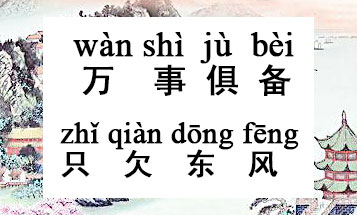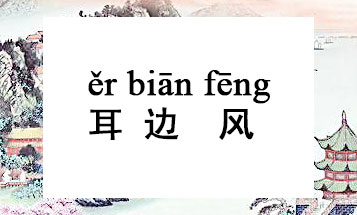
In last week’s test, we learned about the idiom “喝西北风(hē xīběifēng)”, which means getting nothing to eat or having to live on air. Now in this issue we will get to know about two other kinds of “风(fēng)”: “东风(dōngfēng)” and “耳边风(ěrbiānfēng).”

“东风(dōngfēng)” comes from the idiom “万事俱备, 只欠东风(wànshì jù bèi, zhǐ qiàn dōngfēng),” which means that all preparations are finished, except for the last essential one.
This idiom originates from Romance of the Three Kingdoms, one of the four great Chinese classical novels. The story tells of how Zhou Yu (a military general and strategist serving the state of Wu in the late Eastern Han dynasty) conspired to attack the forces of Cao Cao (a warlord and the penultimate Chancellor of the Eastern Han dynasty who laid the foundations for the state of Wei). After all the strategic arrangements were made, the general only then realized that their attack would not succeed if there was no easterly wind.
As time went on, people started using the idiom to express that all is ready except what is crucial.
Wànshì jù bèi, zhǐ qiàn dōngfēng, zhǐyào xīnniáng yí dào, hūnlǐ jiù kéyǐ kāishǐ le.
万事 俱 备,只 欠 东风, 只要 新娘 一 到, 婚礼 就 可以 开始 了。
All is ready except what is crucial. As soon as the bride arrives, the wedding will begin.
Qítāde dōu zhǔnbèi hǎo le, xiànzài zhǐ qiàn dōngfēng. Zhǐyào nádào qiānzhèng wǒmen jiù chūfā!
其他的 都 准备 好 了,现在 只 欠 东风。 只要 拿到 签证 我们 就 出发!
All the other things are ready, we’re just missing one last thing. We can set off once we get our visas!

“耳边风(ěrbiānfēng)” is also called “耳旁风(ěrpángfēng)”. Chinese people often remark that those who ignore others’ suggestions let things “一个耳朵进一个耳朵出(yígè ěrduo jìn yígè ěrduo chū) go in one ear and out the other,” and these kind of people regard others’ words as “耳边风(ěrbiānfēng)”.
“耳边风(ěrbiānfēng)” literally means a puff of wind passing the ear, implying that someone doesn’t listen to or just disregards others’ advice.
Lǐmíng zǒngshì bǎ lǎoshī de huà dāng ěrbiānfēng.
李明 总是 把 老师 的 话 当 耳边风。
Li Ming always turns a deaf ear to the teacher’s words.
Qǐng búyào bǎ wǒ de huà dāng ěrbiānfēng.
请 不要 把 我 的 话 当 耳边风。
Please do not disregard my words.
As you can see, both of these examples employ the “把(bǎ)” structure. Do you know how to use this sentence structure? Take the test to check: Tricky but Essential Grammar: “把(bǎ)”.
Learn more Chinese idioms at Chinese Idiom Story.

1. The idiom “东风(dōngfēng)” originates from the Chinese classical novel ____.
A. Pilgrimage to the West
B. Dream of the Red Chamber
C. Romance of the Three Kingdoms
2. What does “万事俱备, 只欠东风(wànshì jù bèi, zhǐ qiàn dōngfēng)” mean?
A. It goes in one ear and out the other.
B. All is ready except for what is crucial.
C. All preparations are finished.
3. If someone sees your words as “耳边风(ěrbiānfēng),” he or she would ____.
A. take your suggestions
B. ignore your advice
C. discuss your ideas with others
Chinese Popular Words (Fun Stuff)
General Chinese (Beginner Level)
General Chinese (Intermediate Level)



